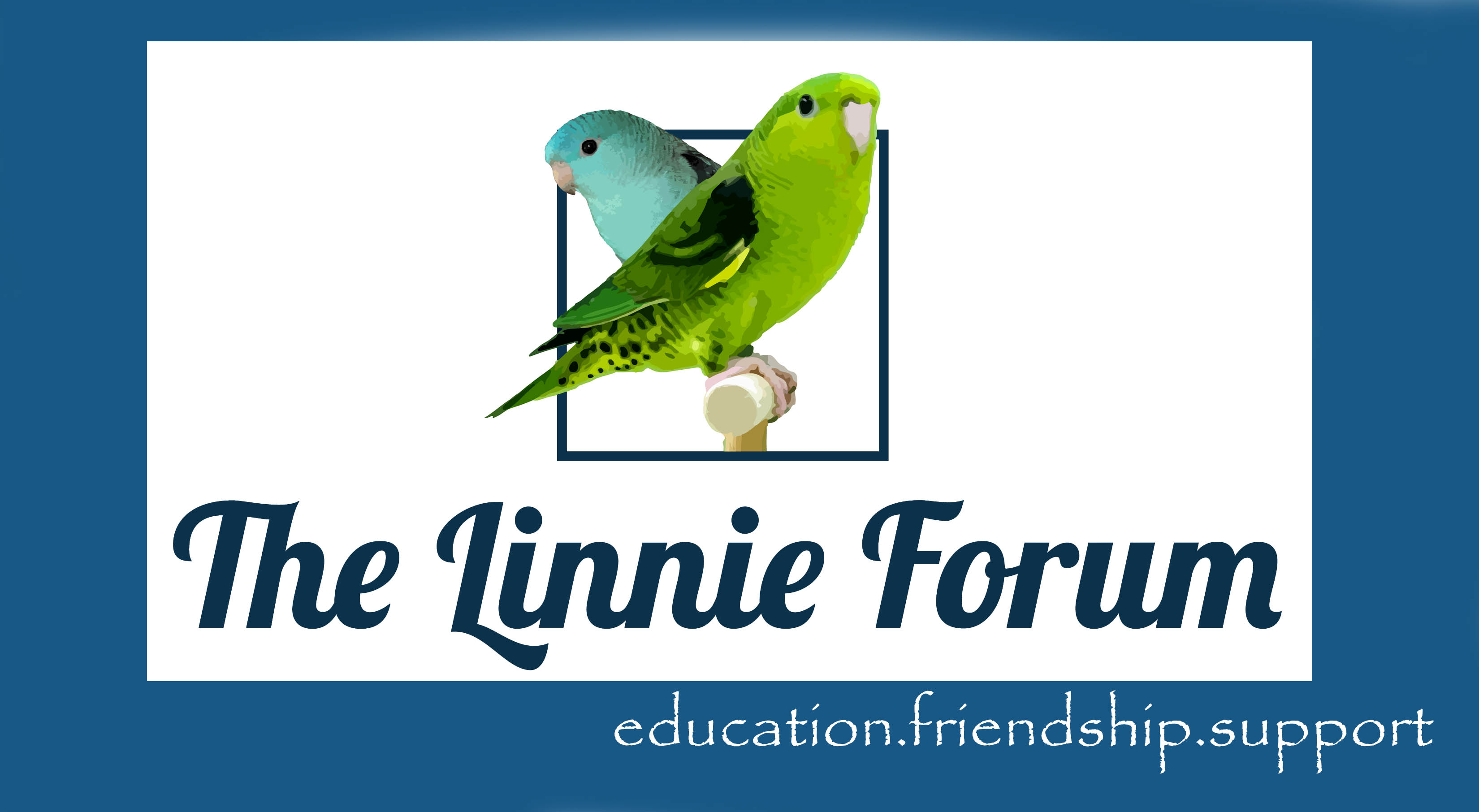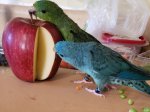Hi everyone! We adopted our Linnie "Goose" from a home where he lived for two years since being hand raised. He's been in our home for about a month now, and we think he's adjusting well enough to start tackling some training and problematic behaviors we're seeing. We would love to hear any advice or relevant experiences you might have! We're really struggling with how to make progress with Goose!
Both I (female) and my partner (male) feel comfortable with Goose and we seem to be able to communicate ok. What I mean by that is that we have been able to tell the difference between beaking (as a little hi / kiss / test before stepping up) and warning nibbles (precursor to a bite) and we haven't gotten to a full-on bite more than once or twice. We've had lots of lovely play times with Goose and he seems to especially love to snuggle in my partner's sweatshirt hood. But so far he only leaves his cage (when we open the door) on his own, and only will step onto sleeves. He is almost never ok with us putting our hands in the cage, even for routine things like changing out the water, etc. He varies in how upset he is about it, but it seems to relate more to his mood than what exactly we're doing. We think he is scared of hands and maybe also a bit territorial of his cage. We have his cage in the living room and are interacting with him throughout the day, including eating dinner in the same room and giving him opportunities to come out for a few hours most mornings and every evening. He's a really sweet little guy; all we want to do is feed him fruit and veggies and sit with him and love him, but sometimes he's so grumpy or even aggressive and chases us off. We want to be able to handle Goose with our hands and generally better understand when he's grumpy and why. Our goal is to clicker train eventually but he often attacks the millet from the get go.
Our main issues are:
1. Hands - how to make him not hate them
We want to be able to handle Goose with our hands and generally have our hands near him without him being very suspicious and/or being clear that he does not want them near him. A reliable "step-up" would be great, so far he only accepts fingers to step up on if he's flown around and gotten himself into an awkward spot behind the sofa or something (outside the cage only). So basically, when he feels like it he does a very nice little step up. Otherwise we get a "no thanks" beaking that escalates to agitated warning chirps and then lunging.
1b. He will even attack hands that approach the cage with a treat, although he often will take a few gentle bites accompanied by happy squeaks and then seemingly out of nowhere start angry sounds that quickly get louder and attacking the food and pushing it away, wings up and head down. We aren't sure why this happens, maybe because he just noticed the hand??
2. Screaming - often he uses his loudest "contact call" non-stop and that is NOT going to work for us or our neighbors
We expect to hear that contact call occasionally, like once or twice as a "hey where'd you go?" or when we're in another room making noises (clanging dishes or whatever), but this is something else. He calls over and over for ten minutes or more. It's a bit like he's whining that we aren't giving him attention. We have been addressing this by not reacting and by praising him when he is being quiet. But last night he shouted for a long time even when out of the cage and on a shoulder... it's really loud! Help! We had to put Goose in his cage and put the blanket over it to get him to stop. Some days he doesn't do it at all, and some days he does it nonstop almost all day and there seems to be nothing we can do to control it. It's really starting to negatively affect us.
Both I (female) and my partner (male) feel comfortable with Goose and we seem to be able to communicate ok. What I mean by that is that we have been able to tell the difference between beaking (as a little hi / kiss / test before stepping up) and warning nibbles (precursor to a bite) and we haven't gotten to a full-on bite more than once or twice. We've had lots of lovely play times with Goose and he seems to especially love to snuggle in my partner's sweatshirt hood. But so far he only leaves his cage (when we open the door) on his own, and only will step onto sleeves. He is almost never ok with us putting our hands in the cage, even for routine things like changing out the water, etc. He varies in how upset he is about it, but it seems to relate more to his mood than what exactly we're doing. We think he is scared of hands and maybe also a bit territorial of his cage. We have his cage in the living room and are interacting with him throughout the day, including eating dinner in the same room and giving him opportunities to come out for a few hours most mornings and every evening. He's a really sweet little guy; all we want to do is feed him fruit and veggies and sit with him and love him, but sometimes he's so grumpy or even aggressive and chases us off. We want to be able to handle Goose with our hands and generally better understand when he's grumpy and why. Our goal is to clicker train eventually but he often attacks the millet from the get go.
Our main issues are:
1. Hands - how to make him not hate them
We want to be able to handle Goose with our hands and generally have our hands near him without him being very suspicious and/or being clear that he does not want them near him. A reliable "step-up" would be great, so far he only accepts fingers to step up on if he's flown around and gotten himself into an awkward spot behind the sofa or something (outside the cage only). So basically, when he feels like it he does a very nice little step up. Otherwise we get a "no thanks" beaking that escalates to agitated warning chirps and then lunging.
1b. He will even attack hands that approach the cage with a treat, although he often will take a few gentle bites accompanied by happy squeaks and then seemingly out of nowhere start angry sounds that quickly get louder and attacking the food and pushing it away, wings up and head down. We aren't sure why this happens, maybe because he just noticed the hand??
2. Screaming - often he uses his loudest "contact call" non-stop and that is NOT going to work for us or our neighbors
We expect to hear that contact call occasionally, like once or twice as a "hey where'd you go?" or when we're in another room making noises (clanging dishes or whatever), but this is something else. He calls over and over for ten minutes or more. It's a bit like he's whining that we aren't giving him attention. We have been addressing this by not reacting and by praising him when he is being quiet. But last night he shouted for a long time even when out of the cage and on a shoulder... it's really loud! Help! We had to put Goose in his cage and put the blanket over it to get him to stop. Some days he doesn't do it at all, and some days he does it nonstop almost all day and there seems to be nothing we can do to control it. It's really starting to negatively affect us.




